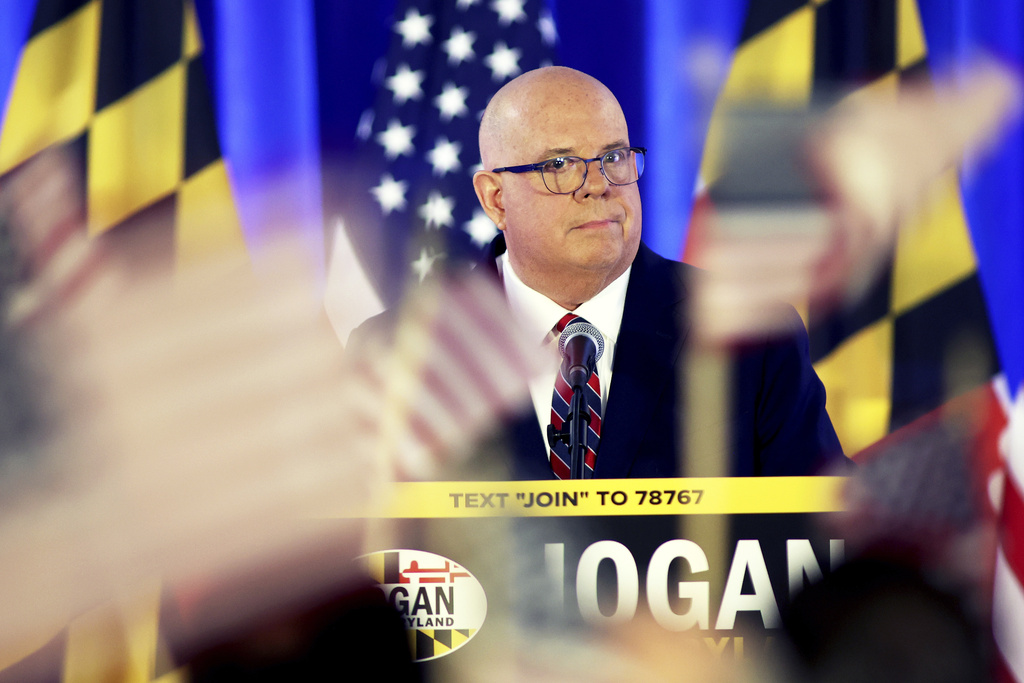

Gov. Jim Justice (R-WV) and former Gov. Larry Hogan easily defeated right-wing challengers on Tuesday night, handing the GOP Senate campaign arm two major victories.
The National Republican Senatorial Committee worked hard to recruit both popular governors in their respective states, with the goal of flipping two blue seats. The committee has been determined to avoid a repeat of their lackluster 2022 midterm performance by wading into key GOP primaries.
Justice framed himself as the strongest candidate to unseat Sen. Joe Manchin (D-WV) before Manchin ultimately announced his retirement from the Senate. The West Virginia Democrat had been considered Senate Democrats’ only chance of holding on to the West Virginia seat. Justice ultimately defeated five-term congressman Alex Mooney (R-WV), who had the endorsement and financial backing of the conservative Club for Growth and several U.S. Senators.
Maryland’s former Republican governor, Larry Hogan, easily won the GOP nomination for a Senate seat being vacated by Sen. Ben Cardin (D-MD), beating six opponents that proved to be little competition. The seat in the heavily Democratic state normally would not be competitive, but Hogan has remained popular with a large swath of voters, including Democrats.
“For eight years, Governor Hogan delivered results for Maryland by reaching across the aisle. Marylanders know they can trust Governor Hogan to keep their communities safe and achieve results in Washington,” said Sen. Steve Daines (R-MT), the chairman of the NRSC in a statement.
Hogan has not received an endorsement from Trump and the two have a long, bitter history. The former Maryland governor has previously said he will not vote for the former president in 2024 and he has consistently been one of the most outspoken Trump critics in the GOP.
Under the leadership of Sen. Steve Daines (R-MT), the NRSC has offered endorsements to not only Justice and Hogan but also Rep. Jim Banks (R-IN), Kari Lake in Arizona, Sam Brown in Nevada, Tim Sheehy in Montana, Eric Hovde in Wisconsin, Dave McCormick in Pennsylvania and Nella Domenici in New Mexico. The committee had remained neutral in the Ohio Senate race, but ultimately endorsed Bernie Moreno after he won the primary.
Daines credited Justice’s entrance into the West Virginia race as a reason Manchin opted to retire, all but guaranteeing Republicans will flip the seat in the ruby-read state.
“When the 2024 cycle began, the Senate race in West Virginia looked like it was going to be a toss-up. That all changed with the recruitment of Governor Jim Justice,” Daines said in a statement. “Governor Justice is one of the most popular governors in the country, and his work to cut taxes and create opportunity for hardworking West Virginians makes him exactly the right person to represent the state in the U.S. Senate.”
The NRSC has not been so heavily involved in primaries since Republicans gained control of the Senate in 2014, working to recruit candidates and clear the field in a number of states. National Republicans discouraged former Indiana Gov. Mitch Daniels from running against Rep. Jim Banks (R-IN) for Sen. Mike Bruan’s open seat, according to a source familiar.
In Montana, Rep. Matt Rosendale (R-MT) ultimately ended his Senate bid less than a week after announcing a run, claiming he did not have a path forward after former President Donald Trump endorsed his primary opponent, Tim Sheehy, who was recruited by NRSC.
In Pennsylvania, David McCormick, the former hedge fund executive, launched his bid with an open field, after Doug Mastriano, a failed gubernatorial candidate who denied the 2020 election results, considered running but ultimately passed on a Senate bid.
In Wisconsin, the committee launched an effort to woo Rep. Mike Gallagher (R-WI), but he ultimately passed on a run against Sen. Tammy Baldwin (D-WI) and decided to retire early. However, they were able to recruit Eric Hovde, a wealthy businessman, to run, while keeping out a polarizing former Milwaukee County Sheriff, who had been eyeing a bid.
Trump and Daines also worked together to recruit former Rep. Mike Rogers (R-MI) to run for Senate in Michigan, giving GOP leaders a credible candidate in a state where Republicans had been struggling to secure a strong recruit to compete for retiring Sen. Debbie Stabenow’s (D-MI) seat.
“The primaries just killed us in 2022 and the candidates that won were just shocking,” said a Republican consultant, speaking on the condition of anonymity. “I think we are in a much better position this cycle to take the majority.”
GOP Senate primaries last cycle were dominated by hard-line conservative candidates who ultimately cost the party its chance of retaking the majority. Even after some in Senate GOP leadership like Minority Leader Mitch McConnell (R-KY) warned about electability problems, the former National Republican Senatorial Committee Chairman Sen. Rick Scott (R-FL) remained neutral during the primaries. Untested candidates like former football player Herschel Walker and talk show host Mehmet Oz lost against their Democratic rivals, costing Republicans the Senate.
With Hogan and Justice, Senate Republicans “succeeded in ‘24 where they failed in ‘22 by recruiting and nominating politically popular candidates that effectively change the entire map for the party,” said Josh Holmes, a Republican strategist with ties to McConnell in a post on X on Tuesday night.
While national Republicans are in a strong position this cycle, new battleground state polling shows Democrats are ahead in Arizona, Nevada, Pennsylvania and Wisconsin, and are consistently running ahead of President Joe Biden, a sign GOP candidates have their work cut out for them in those states.
In addition, a top outside group linked to Senate GOP leadership recently announced they are providing $70 million in five key battleground states. However, they are currently not providing funding for races in Arizona and Maryland, which could signal the group doesn’t feel confident about their prospects in those states.
Democrats argue Senate Republicans shouldn’t be celebrating yet, claiming that the GOP candidates in races in Montana, Pennsylvania, Wisconsin, Nevada, Ohio, and Arizona are flawed.
“Senate Republicans’ roster of recruits is reeling from a series of reports uncovering their lies about their biographies, vulnerabilities tied to their finances, and a lifetime of toxic statements and policy positions,” said Tommy Garcia, a spokesman for DSCC. “Meanwhile, their primaries in states like Nevada and Michigan are erupting in chaos. The NRSC’s big bet to back a bunch of unvetted carpetbaggers is looking worse by the day.”
CLICK HERE TO READ MORE FROM THE WASHINGTON EXAMINER
In Wisconsin, Pennsylvania, and Nevada, GOP candidates are being pressed on whether they live in the state. In Montana, Sheehy recently admitted he lied about the circumstances of a gunshot wound in Glacier National Park, according to reporting from the Washington Post. In Ohio, Moreno boasted about his success as the owner of a car dealership, but now may be turning to donors for help repaying loans he made to his campaign.
Democrats still face an uphill battle to hold their Senate majority. Now with West Virginia likely flipping to Republicans, the party will have to win every competitive Senate seat along with the White House to enable Vice President Kamala Harris to utilize her tiebreaking vote next year. Even if Democrats win every competitive seat other than West Virginia, if they lose the White House, Republicans will control the upper chamber.







